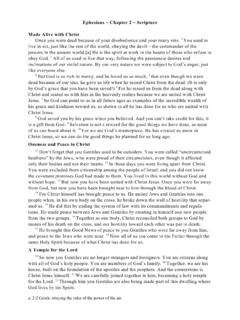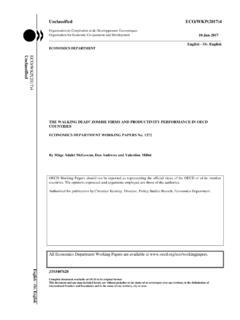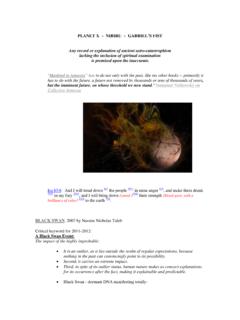Transcription of Doctrine of the Old Sin Nature - alive and powerful
1 Doctrine of the Old Sin Nature 1) Introduction and Preliminary Considerations. a) This Doctrine is a primary component of Biblical anthropology, the study of man and his Nature . b) There are basically two approaches which one may use to attempt to understand man, his Nature , and his behavior. i) Human philosophy. ii) Divine revelation. c) Human philosophy cannot arrive at a true understanding of man, since it does not correctly consider the soul, the immaterial, but real part of man. d) True anthropology (Biblical anthropology) incorporates all that comprises man's being, both material and immaterial.
2 I) Throughout this study a distinction must be maintained between the soul and the physical brain (which is contaminated by the old sin Nature . ii) While the physical body can be destroyed, the living soul is invisible, but real, and cannot be destroyed by human means (MATTHEW 10:28: "and stop fearing those who kill the body, but are unable to kill the soul; but rather fear Him who is able to destroy both soul and body in hell." (1) Stop fearing : (a) Fearing is the present imperative of fobe,w (PHOBEO, to fear). (b) The imperative appears with the negative mh,, (ME).
3 (c) The present imperative with the negative particle generally constitutes the command to stop an action already in progress. (d) Here Jesus issues the command to stop fearing men, those who can kill the body, but not the soul. (2) Kill : (a) The participle, avpoktei,nw (APOKTEINO). (b) The word means to forcefully eliminate, to deprive of life, to kill. (c) Jesus indicates that men are able to kill the body, but unable to kill the soul. (d) A good reason for not fearing men emerges from the fact that the worst they can do does not match what God can do.
4 (e) The body is temporary; but the soul eternal. (3) Destroy : (a) The Greek word is avpo,llumi (APOLLUMI). (b) A major nuance of this word is ruin. (c) It means to put out of the way, to abolish. (d) It is used metaphorically for giving the soul over to eternal ruin or misery in hell. (e) However, the word does not indicate that the soul is annihilated in hell. Scripture clearly indicates that the one who goes to hell (ultimately to the lake of fire) suffers eternal torment there (Matt. 25:41, 46, 2 Thess. 1:9; Rev. 19:20; 20:10, 15).
5 (f) In John 3:16, avpo,llumi (APOLLUMI) is translated perish. The one who believes in Jesus Christ will not perish (suffer eternal ruin in hell) but will have eternal life. 1 Doctrine of the Old Sin Nature iii) It is the soul which is initially saved when one believes in Christ. In comparison with the body, the soul is infinitely more important. (1) Negative volition, human viewpoint, and reversionism reverse the order of importance, with great emphasis being placed on the body and little or no importance placed on the soul.
6 (2) The apostle Paul makes it clear that the body is of secondary importance in the Christian way of life (1 Tim. 4:8). iv) The brain, a sophisticated computer which interprets afferent impulses (input from the five senses) and sends out efferent impulses, which cause the body to act or react, is made up of various sophisticated biochemical elements which the Bible calls dust (GENESIS 2:7; Then YHWH Elohim formed man from the dust of the Eccl. 12:1-7). (1) The subject of the context in Ecclesiastes is the sin unto death in old age.
7 It is, of course, at this point that the body returns to dust (The fact that these times are called the evil days indicates the sin unto death. This along with the statement, I have no delight in them, indicates an absence of Divine viewpoint and absence of dying grace. So what is pictured here is the ravages of old age which precede the sin unto death, which is brought about by reversionism. Obviously, remembering one's Creator does not totally eliminate the infirmities of old age. It is clear therefore, that remembering one's Creator deals with Bible Doctrine in the soul and dying grace in old age.)
8 (2) The reversionistic believer is advised to remember his Creator before these things and this attitude ( no delight ) befalls him. (3) In this context, the various parts of the body and their failure are symbolically depicted: (a) The watchmen of the house = the hands and arms (they tremble). (b) The mighty men = the legs (they stoop or bow). (c) The grinding ones = the teeth (they stand idle because of poor appetite and they are few because many have fallen out). (d) Those who look through the windows = the eyes (they grow dim; vision fails).
9 (e) Doors of the street shut = the toothless mouth must be kept tightly shut or food will fall out; the sound of the grinding mill is low = few teeth (grinding ones) means there is not much noise in chewing. (The picture here is of the toothless, or almost toothless, mouth tightly closed to keep food from dribbling out, while at the same time, not much noise is produced by chewing). (f) Arising at the sound of the bird = poor sleep; the slightest noise will awaken. (g) All the daughters of the song will sing softly = poor hearing.
10 (h) Afraid of a high place = fear of falling. (i) Terrors on the road = no strength for travel. (j) Man goes to his eternal home = death. (k) The silver cord = the interface between the soul and the brain computer. 2 Doctrine of the Old Sin Nature (l) The golden bowl = the brain, which is shut down in death (when the silver cord is broken the soul is removed). (m) The pitcher by the well is shattered and the wheel at the cistern is crushed = the heart and circulatory system cease to operate upon the removal of the soul. (4) When this happens, the dust returns to the earth, and the spirit returns to God who gave it (verse 7).







